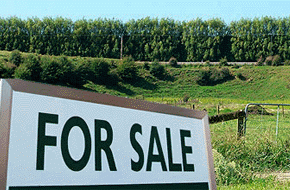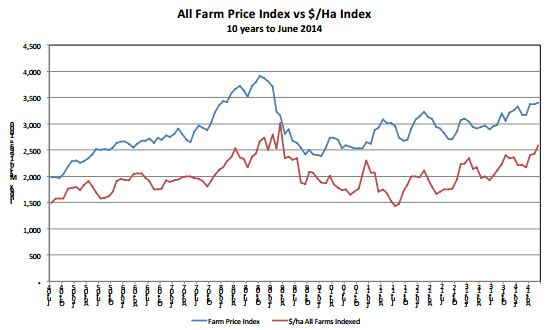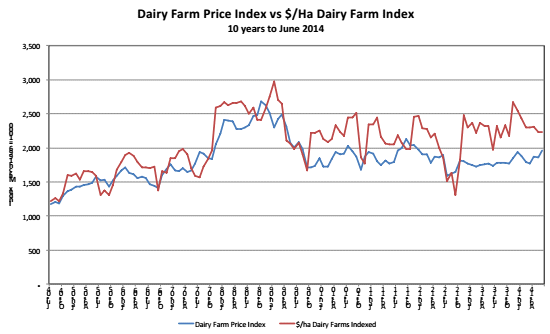
Content supplied by REINZ
Data released today by the Real Estate Institute of NZ (REINZ) shows there were 70 more farm sales (+14.8%) for the three months ended June 2014 than for the three months ended June 2013.
Overall, there were 544 farm sales in the three months to end of June 2014, compared to 564 farm sales for the three months ended May 2014 (-3.5%).
1,912 farms were sold in the year to June 2014, 27.4% more than were sold in the year to June 2013.
The median price per hectare for all farms sold in the three months to June 2014 was $26,612 compared to $19.716 recorded for three months ended June 2013 (+35.0%).
The median price per hectare rose 6.4% compared to May.
The REINZ All Farm Price Index rose 0.9% in the three months to June compared to the three months to May, moving from 3,374.0 to 3,405.7.
Compared to June 2013 the REINZ All Farm Price Index rose by 16.7%.
The REINZ All Farm Price Index adjusts for differences in farm size, location and farming type compared to the median price per hectare, which does not adjust for these factors.
Nine regions recorded increases in sales volume for the three months ended June 2014 compared to the three months ended June 2013. Bay of Plenty recorded the largest increase in sales (+27 sales), followed by Otago (+12 sales) and Northland (+11 sales). Compared to the three months ended May 2014, five regions recorded an increase in sales.
“Sales volumes and prices for the three month period to June 2014 reflect the trends shown in the overall market in recent months”, says REINZ Rural Spokesman Brian Peacocke, “While figures for the 12 month period show a strong lift, from a monthly perspective evidence suggests steady incremental increases rather than ongoing dramatic surges.”
“As expected for the cross over period from one season to the next current activity is reported as being reasonably quiet. Farmers and market observers alike are cautiously gauging the potential impact on the forthcoming sales season as a result of clear signals regarding a possible reduction in incomes from the mix of lower product prices, rising interest rates and the very strong New Zealand dollar.”
Noteworthy points include:
- A significant drop in dairy farm sales for the period, with most activity in the Waikato and Southland.
- Consistently steady sales of finishing and grazing properties, particularly in Auckland and Hawkes Bay in the North Island and Canterbury, Otago and Southland in the South Island.
- Very solid sales activity in the horticultural sector, particularly in the Bay of Plenty, which is experiencing a resurgence of interest in the kiwifruit industry.
Grazing properties accounted for the largest number of sales with 43.4% share of all sales over the three months to June, Finishing properties accounted for 21.1%, Dairy properties accounted for 12.7% and Horticulture properties accounted for 10.5% of all sales.
These four property types accounted for 87.7% of all sales during the three months ended June 2014.

Dairy Farms
For the three months ended May 2014 the median sales price per hectare for dairy farms was $33,543 (69 properties), compared to $33,543, for the three months ended May (95 properties), and $29,555 (66 properties) for the three months ended June 2013.
The median dairy farm size for the three months ended June 2014 was 125 hectares.
Included in sales for the month of June were 15 dairy farms at a median sale value of $45,007 per hectare.
The median farm size was 111 hectares with a range of 34 hectares in the Waikato region to 521 hectares in Canterbury.
The median production per hectare across all dairy farms sold in June 2014 was 1,130 kgs of milk solids.
The REINZ Dairy Farm Price Index rose by 5.2% in the three months to June compared to the three months to May, from 1,859.7 to 1,956.4. Compared to June 2013, the REINZ Dairy Farm Price Index rose by 12.5%.
The REINZ Dairy Farm Price Index adjusts for differences in farm size and location compared to the median price per hectare, which does not adjust for these factors.

Finishing Farms
For the three months ended June 2014 the median sale price per hectare for finishing farms was $26,694 (115 properties), compared to $22,692 for the three months ended May (122 properties), and $18,672 (92 properties) for the three months ended June 2013.
The median finishing farm size for the three months ended June 2014 was 46 hectares.
Grazing Farms
For the three months ended June 2014 the median sales price per hectare for grazing farms was $15,833 (236 properties) compared to $15,833 for the three months ended May (228 properties), and $13,831 (228 properties) for the three months ended June 2013.
The median grazing farm size for the three months ended June 2014 was 66 hectares.
Horticulture Farms
For the three months ended June 2014 the median sales price per hectare for horticulture farms was $193,745 (57 properties) compared to $186,250 (55 properties) for the three months ended May, and $120,345 (42 properties) for the three months ended June 2013.
The median horticulture farm size for the three months ended June 2014 was seven hectares.
7 Comments
There are still plenty or dairy investment opportunities out there.
http://www.stuff.co.nz/business/farming/dairy/10076439/MyFarm-eyes-inve…
Aj that MyFarm business is one set of investors looking to unload their share to another set of investors. Also if you check out the MyFarm website regarding that same farm it shows that you can invest directly in the farms for a minimum of $250,000 or invest in to a My Farm company which will invest in to the farm, for a min of $25,000. Offer closes on 30 July and it doesn't say that the offer is already full or the farm already invested in by investors under the $250k minimum. Perhaps they are struggling to find investors?
At South Island Dairy Event (www.SIDE.org.nz) in June there was a workshop on equity investment. Advice generally was not to go in to an equity farm with more than 5 investors and make sure you sit down with them before you commit, to check that you will be able to work with them. 3-5 investors was suggested as the best range for numbers of investors. There was some very interesting comments from the audience, who were involved in equity partnerships in the discussion part of the workshop.
There's always someone with a great idea on how to spend your money.
I have a few friends who are equity partners in dairy farms, none are happy and haven't been happy for a while, now they will be really unhappy.
There was also a general consensus that there is a move away from syndicate companies to limited partnerships. One piece of solid advice was to make sure there is a shareholder agreement with sunset clauses in it. A real life example was told of, of a syndicated company that has been in court for four years - and still no resolution - due to no shareholder agreement.
As I've been saying the return of equity in dairy is shocking.
Its because farmers like to capitalise their profits. On the downside it can get a bit ugly, did you keep your capital? because it could get interesting from here on in.
Farmers have to capitalise there profits, because the profits are so poor. Hence my reference to the landlording action, deduct what a normal business would pay in rent and many farms would be struggling to breakeven, even on good years.
Hence my comment is aimed at equity. capitalise your profit just increases your equity.
Most farmers I've quietly asked just ignore the issue and say "we only deal with "real money" like interest cost and profit, not with "theories" about worth and returns".
In other words, they only count the operational profit, against the cost of operating, not against the equity that is required to produce it. If you're ignoring equity cost, capitalising all profit makes you look profitable... when you're not. The result of this, is that that assets are then a wealth store, which being a working asset -should- be producing income...which in this case isn't because the farmers ignore it. This allows Fonterra to pay discounted rates for their raw materials. A wealth-store used to produce income, should be paying tax on it's income...but if no income is being deliberately achieved then it is likely that the government will have to resort to a land tax or wealth tax in some fashion to get at the returns that they should have been receiving from the trade profit created by the asset.
Non-income private wealth stores are consumer items, and thus taxing them would be a double taxation - (1) they're not arranged to produce income, and (2) they represent an accumulation of tax-paid earnings. The farm passes on (2), but avoids on (1).
We welcome your comments below. If you are not already registered, please register to comment
Remember we welcome robust, respectful and insightful debate. We don't welcome abusive or defamatory comments and will de-register those repeatedly making such comments. Our current comment policy is here.